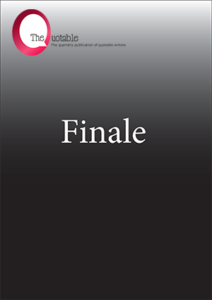Interview with Graham Tugwell
1. How did you come up with the idea for your story?
The story was inspired by the black and amber flag of the village I’m from (which, out of respect for its benighted denizens, shall remain nameless) and the desire to write a short story that switches between two complimentary points of view. Words and images resonate between these two narratives, either complimenting or directly opposing each other— patterns of light and dark, silence and noise, the crowd and the individual, public and private. This structure came first, and it informed the content and the themes of the story.
There were a number of disparate images that occurred to me while I was writing the story—a crowd marching nine abreast, a hooded man kneeling in floodlights— and I built the story to earn these resonant bits and pieces.
Also, since the story is part of a larger forty-five story sequence I had lots of themes in the back of my mind to play with—identity and community and the role of story, which occasionally pop into prominence. I try to hint at a bigger story in the background without having it impinge on the story being told.
2. What is your writing process?
My writing process is very straightforward. Every day, come rain or shine, I endeavour to write a certain amount of words—for most of last year it was 500 words a day, though as that has gotten easier to achieve I have recently increased to 666. I write even when I’m not in the mood for writing, or when I’m not feeling particularly creative– If all goes to plan I can finish a short story every three to four days and move on to the next one, and that’s been pretty constant for the last year. At the time of writing I’ve just finished my seventy-third story and have begun my seventy-fourth. (I really need a break!)
The three days I spend on each story generally proceed the same way: on the first day, starting with the title, I explore this idea and figure out style and technique, format and tense. The second day is when I ‘break’ the story—figuring out exactly what the ending is and how I get there, what the emotional arc of the story is. The last day is a gruelling as I polish every sentence maybe three or four times, editing as I go until the story is down to 1,500 or 2,000 words exactly. Why exactly? This is discipline on my part, to interrogate whether something I say in seven words could be said in six—images and language should be clear and precise. There’s no room for hesitant or equivocal prose! Then it’s on to the next one. Titles pop into my head all the time. Turning them into stories is hard work.
3. “And Oh, the Fun They had that Friday Night” seems to be set in a macabre alternate realm, are you a fan of The Twilight Zone or The Outer Limits?
I would hesitate to label it an alternate realm— that brings to mind scenarios such as Nazis taking over America and things like that! I prefer to think of it as ‘heightened’ rather than ‘alternate’— certain propensities are magnified for satirical purposes, but, I would hope, the world is still recognisable as our own, that in some isolated and cut-off place things like this could conceivably happen…
Although I’ve only recently discovered the Twilight Zone and The Outer Limits for myself, they are shows that I have developed an admiration for. There is a perfection and a unity to each episode, devoted as it was to the development and execution of a singular idea. There is also what may be a heavy-handed, but I believe sincere commitment to an allegorical mode, which lent both shows a modern mythological scope and a lasting appeal. If I can capture the slightest hint of this in my own work I will be very happy!
Personally, I think this is what all short stories should aim for— the exploration of a perfect moment, whether it be apocalyptic moment, a moment of clarity or realisation, when the workings of the world are laid bare in all their beauty, in all their horror.
4. The point of view characters seems to be of the opinion that they do not fit in the town, which ultimately leads to a tragic end for one of them. Do you think it is a symptom of small towns to condemn vehemently that which does not belong?
It certainly is, particularly where this fictional town is concerned! It would be wrong to condemn small towns out of hand but in the heightened reality of my story it is certainly the case that individual difference, whether it be in thought and action, is a threatening thing to the amorphous being that is the Crowd. The weapons used by this society to condemn difference are cruelty and shame and this fictional reality is constructed in such a way that the Crowd will always triumph. The protagonist, by assuming the role, has assured their doom because all stories must end.
5. The girl in your story, though horrified by what she witnesses, has a steely resilience which suggests she has not been frightened into conforming to the norms of the town. Do you think there really is an escape in a society so violently suppressive?
A short answer- no! There are three rules that I follow when writing that choke out all hope of escape—they are, crudely stated, 1) There is no God. 2) Love is impossible 3) The universe is malign. This is how the world operates in my fiction; the steely resilience of one little girl is no match. But though she is doomed to failure, nothing will stop her trying.
I consider myself a writer of horror—not the gory, splattery, short sharp shock variety, but that crawling horror that comes in the hours and days afterwards, that comes unbidden, when images and words are recalled with a shudder. The most effective horror comes when things are only slightly wrong, when the familiar is made softly strange. That is what I strive for, and as in this story, I find it on the threshold between childhood and adulthood, with the world so big and threatening, and there is no choice but to look for the magic word or the ritual that transforms you from one state to the next.
6. You’ve stated that the setting of this story is based on a real town – what do you want us to know about the real town and should we be scared of visiting?
If you can find it, you’re more than welcome to come.
You’ll never leave!
Image by Vincepal










